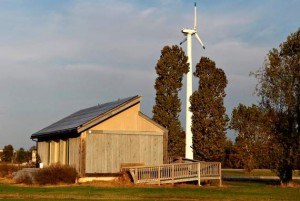By James Walls
Copy Editor
 Should Crowder be more environmentally friendly? Helping lead the way in alternative energy for local colleges, the question may seem rather irrelevant. However, at the same time, it is obvious there is still much work to be done before it can truly be green.
Should Crowder be more environmentally friendly? Helping lead the way in alternative energy for local colleges, the question may seem rather irrelevant. However, at the same time, it is obvious there is still much work to be done before it can truly be green.
“I believe we will try to improve all of our buildings over time,” said Dr. Jim Cummins, Vice President of Finance, discussing ways to make the Neosho campus more efficient. “We are looking at some energy saving measures in Newton and McDonald Hall right now.”
While repairs are being discussed to cut back on energy consumption, recycling bins are also being set up around campus to reduce waste as well. This, in itself, proves the desire to go green. But how does this compare to other colleges and universities?
Bates College, located in Lewiston, Maine, is known for reducing its food waste by composting, recycling and donating nearly 82 percent of its scraps and leftovers. At the same time, Dickinson College in Carlisle, Penn. collects used fryer oil to produce 1,500 gallons of biodiesel to use in their campus automobiles. Both of these concepts seem like possible implementations for Crowder to take on, and would help cut down on excess waste, as well.
Despite this, one must consider the costs to take on such projects. According to Russ Hopper, Executive Director of the Missouri Alternative and Renewable Energy Technology (MARET) Center, recycling doesn’t often pay, and sometimes even costs more than one would desire.
“One limiting factor of how Green we can be is money,” Cummins stated, voicing Hopper’s same sentiment.
However, consider Colorado College’s aCClimate 14 conservation campaign which encouraged its students to cut down on energy consumption by 14 percent. By promoting the campaign regularly and offering tips on how to cut down individual resource use, the campus exceeded their goal and saved nearly $100,000 in utility costs, as well as cutting greenhouse gas emissions by a great margin. Therefore, if Crowder were to take on such a task and succeed, imagine what other green projects could be taken on with the money saved from typical utility costs.
So what are the chances of the campus taking on such an endeavor?
“Absolutely,” Cummins said when asked if Crowder would consider such a campaign. “I don’t think there is anything we won’t consider. What makes these projects successful is a driver that has the passion and expertise to lead the effort.”
While many efforts are being taken to make Crowder a greener campus, it is apparent that there is still a long road ahead. However, with so many already planning out its future, one can only hope that the progress continues, not only for the students, but also for the environment.





Leave a Reply